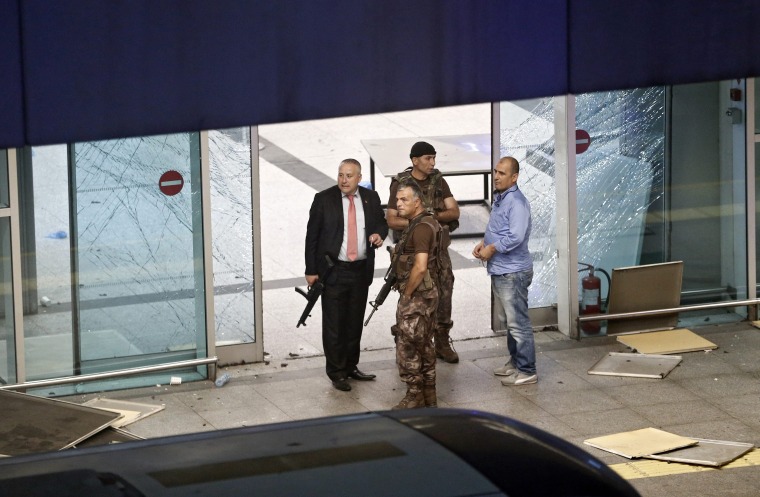A suspected terrorist attack on an Istanbul airport appears to be another example of the type of nightmare scenario security experts dread: attackers blending in with the crowd at public places to carry out acts of mass murder.
The ability to defend "soft targets" — places where it's relatively easy for a small group of terrorists to cause widespread and deadly devastation — remains elusive.
Such "soft targets" include airports, buses and trains, schools, hospitals, restaurants and shopping malls — places with very little security where lots of people gather freely.

In the U.S., security officials and experts have long worried that these types of places are extremely vulnerable.
"If you have a determined terrorist who is willing to give up their life … it's almost impossible to prevent that across the board," John Pistole, a former administrator with the Transportation Security Administration, told NBC News in March
It is a scenario that has played out multiple times with devastating effects.
- Two weeks ago in Orlando, a gunman walked into a nightclub with minimal security and opened fire on patrons, eventually killing 49 people and wounding dozens more before police killed the attacker.
- In March, deadly terrorist bombings at Brussels' international airport and a subway station killed 32 people and injured more than 200. Authorities say the suicide bombers were brothers who, according to surveillance video, pushed loaded carts in the busy airport's check-in area.
- In December, a self-radicalized couple working out of their home shot and killed 14 people and wounded 21 others in a holiday party at an unguarded community center in San Bernardino, California.
- A month earlier, a series of suicide bomber attacks in Paris at a soccer stadium, restaurants and a nightclub, left 130 people dead -- a toll that surely would have been higher had security checkpoints at the soccer match not stopped one of the assassins.
The vulnerability of such "soft targets" worries lawmakers.
"It's one thing to hit a building, a building is one thing. It's another thing to hit a soft target. To walk into restaurants where people are having a Friday night dinner, to kill everybody you can kill. To go into a concert hall, do the same thing," California Democrat Sen. Diane Feinstein, the ranking Democrat on the Senate Intelligence Committee said in November after a classified briefing on the attacks in Paris.
Secretary of State John Kerry has also previously expressed concern about soft targets, pointing out that terrorists who bomb such places as subways and restaurants are trying to capitalize on the randomness of the locations to "sow terror."
"Shopping malls, a restaurant — anywhere. The idea is to make us believe that we are always going to be in such grave and imminent danger that we actually have to stop what we're doing and change our choices and change our way of life," Kerry said after the Paris attacks in an address to the State Department's Overseas Security Advisory Council.
In the wake of the Brussels attack, security at airports around the world was beefed up. The U.S. Department of Homeland Security added police officers and tactical units, behavior detection officers and bomb sniffing dogs. There also was an increase in random checks and checkpoints.
Experts say that, beyond security areas, many areas in airports can be as vulnerable as shopping malls. While increased law enforcement presence is a deterrent, it is impossible to police every single soft target.
"When you look through the playbook that most terrorists have, they gauge the hardness of the target and if they believe if there's not a visible presence, a visible deterrence there armed, then they will see it as a vulnerability and possible target," John Halinski, a former deputy TSA administrator told NBC News after the Brussels attack.
That may mean picking key times and key points to place increased security at such places as airports, Halinski said.
Experts say the public also has to be especially vigilant when it comes to areas considered "soft targets."
That means looking out for people who may be surveilling a location and trying to gather such information about things like security staff shift changes and testing security with false alarms.
Halinski said "It boils down, and this is a saying that's a cliche but I truly believe in it...see something, say something."
Ataturk International, where Tuesdays's attack occured, was the 11th busiest airport in the world last year, with 61.8 million passengers, according to Airports Council International.
